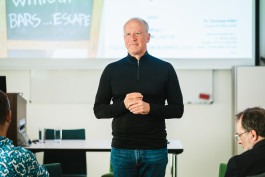
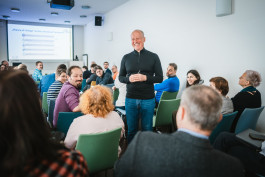
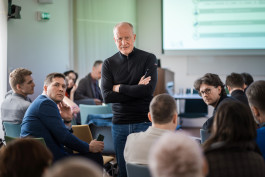
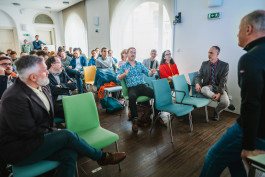
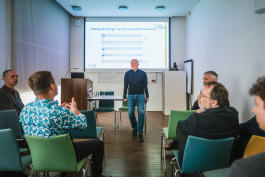
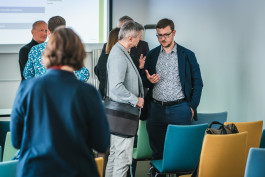
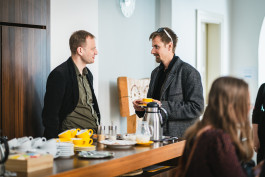
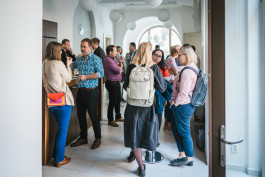
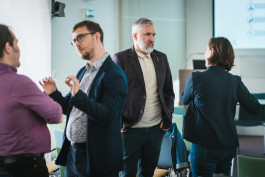
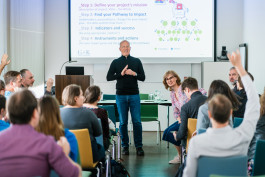
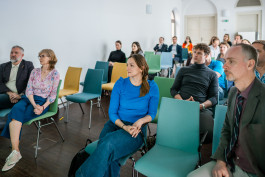
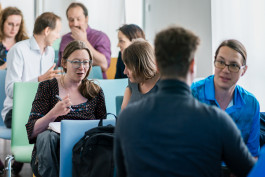
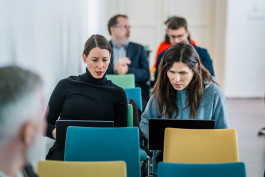
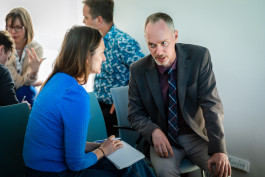
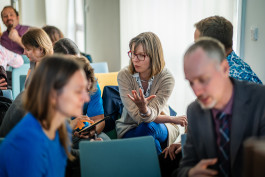
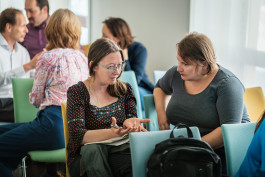

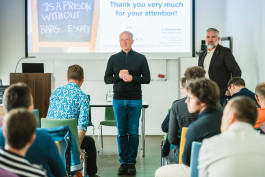
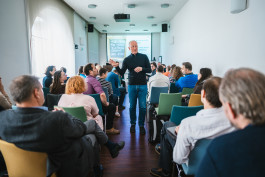
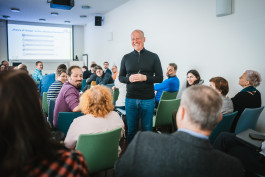
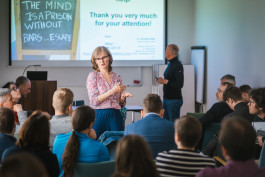
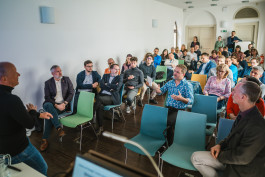
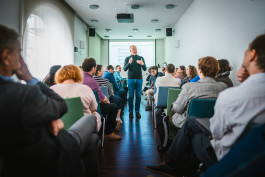
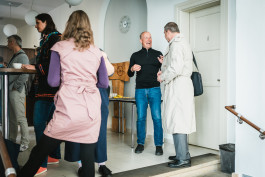
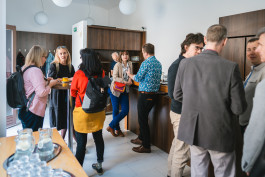

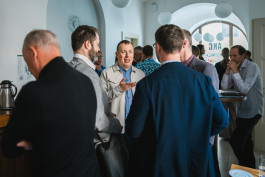
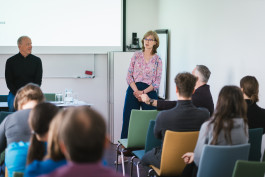
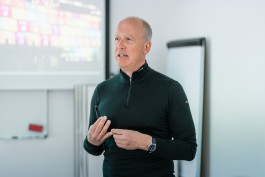
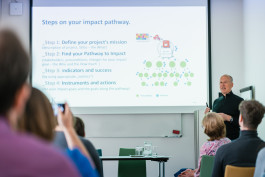
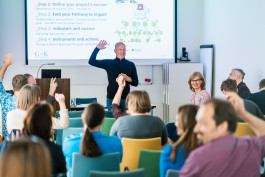
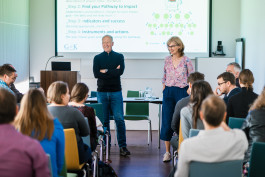
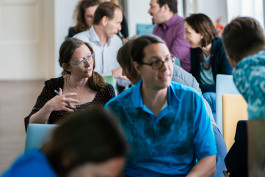
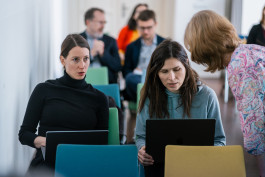
On 7 May 2025, CETE-P co-organized a lecture and workshop on the concept of SHAPE: Social Sciences, Humanities, and Art for People and Economy with Christoph Köller, an internationally recognized expert on societal impact and the valorization of research in SHAPE. It took place in the Academic Conference Center in Prague.
While technological innovation is visible, the contribution of the humanities, social sciences and arts often remains hidden and untapped. Yet it is these disciplines that are providing crucial answers to the key challenges of our time - from the ethical aspects of artificial intelligence to the resolution of societal crises, often in transdisciplinary collaboration with other disciplines.
But the question is: How to measure and achieve impact in humanities?
Christoph Köller presented the basic principles he works with, which he believes are crucial for success of projects.
To be able to measure results and impact of activities, according to Köller it is essential to set strategic goal and impact of the activities right. At the same time, impact in social sciences, humanities and art cannot be measured only by successful patents or commercial success, but rather by whether the project contributed to positive change or had the intention to contribute to positive change. And each institution has to determine for itself what the impact means for it and how to communicate it externally, there is no universal recipe how to do it. It is also necessary to be patient and wait to see if the impact will be felt.
At the same time, there should be no pressure to commercialise research in the humanities. According to Köhler, intrinsic motivation is an essential element in the application of SHAPE. Scientists have more motivation to contribute to education and knowledge transfer than to economic growth. Commercialisation in SHAPE means becoming independent of donor funding rather than generating profit.
Also, according to Köller, creating societal impact requires functional infrastructure as well as linking the humanities with other disciplines. This thesis was supported by Ondřej Beránek, Vice President of CAS, in his opening speech, mentioning that CAS came up with their own concept focused on knowledge transfer with a special emphasis on the social sciences and humanities. Its aim is to systematically grasp and support various activities that contribute to the development of society in different fields and across them.
At the workshop, lead by Christoph Köller and Ivana Sýkorová, participants could design concrete procedures for the valorisation of scientific results in their own projects.
The event was co-organized by CETE-P in cooperation with TAH — Centre for Innovations in Technology, Art, and Humanities, and CETAV (Transfer Centre of the Czech Academy of Sciences).
For further info on the topic visit: https://www.avcr.cz/cs/o-nas/aktuality/Akademie-ved-Chceme-naplno-vyuzit-potencial-humanitnich-a-spolecenskych-ved-00001/
Photos: Romana Kovacs
























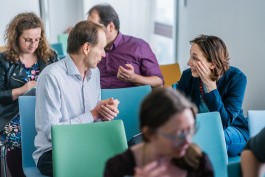



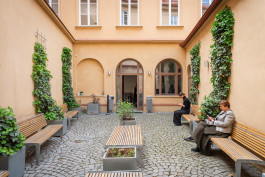


On 7 May 2025, CETE-P co-organized a lecture and workshop on the concept of SHAPE: Social Sciences, Humanities, and Art for People and Economy with Christoph Köller, an internationally recognized expert on societal impact and the valorization of research in SHAPE. It took place in the Academic Conference Center in Prague.
While technological innovation is visible, the contribution of the humanities, social sciences and arts often remains hidden and untapped. Yet it is these disciplines that are providing crucial answers to the key challenges of our time - from the ethical aspects of artificial intelligence to the resolution of societal crises, often in transdisciplinary collaboration with other disciplines.
But the question is: How to measure and achieve impact in humanities?
Christoph Köller presented the basic principles he works with, which he believes are crucial for success of projects.
To be able to measure results and impact of activities, according to Köller it is essential to set strategic goal and impact of the activities right. At the same time, impact in social sciences, humanities and art cannot be measured only by successful patents or commercial success, but rather by whether the project contributed to positive change or had the intention to contribute to positive change. And each institution has to determine for itself what the impact means for it and how to communicate it externally, there is no universal recipe how to do it. It is also necessary to be patient and wait to see if the impact will be felt.
At the same time, there should be no pressure to commercialise research in the humanities. According to Köhler, intrinsic motivation is an essential element in the application of SHAPE. Scientists have more motivation to contribute to education and knowledge transfer than to economic growth. Commercialisation in SHAPE means becoming independent of donor funding rather than generating profit.
Also, according to Köller, creating societal impact requires functional infrastructure as well as linking the humanities with other disciplines. This thesis was supported by Ondřej Beránek, Vice President of CAS, in his opening speech, mentioning that CAS came up with their own concept focused on knowledge transfer with a special emphasis on the social sciences and humanities. Its aim is to systematically grasp and support various activities that contribute to the development of society in different fields and across them.
At the workshop, lead by Christoph Köller and Ivana Sýkorová, participants could design concrete procedures for the valorisation of scientific results in their own projects.
The event was co-organized by CETE-P in cooperation with TAH — Centre for Innovations in Technology, Art, and Humanities, and CETAV (Transfer Centre of the Czech Academy of Sciences).
For further info on the topic visit: https://www.avcr.cz/cs/o-nas/aktuality/Akademie-ved-Chceme-naplno-vyuzit-potencial-humanitnich-a-spolecenskych-ved-00001/
Photos: Romana Kovacs
•• All News
Celetná 988/38
Prague 1
Czech Republic
This project receives funding from the Horizon EU Framework Programme under Grant Agreement No. 101086898.